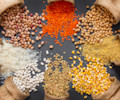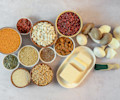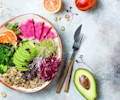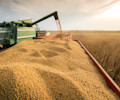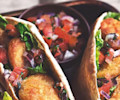Shiok Meats Pte. Ltd. is a cell-based clean meat company and the first of its kind in Singapore and South-East Asia. Its mission is to bring delicious, clean, and healthy seafood and meats by harvesting from cells instead of animals. Shiok Meats will bring cell-based crustacean meats (shrimp, crab, lobster) to your table. Its meats are animal-, health- and environment-friendly, with the same taste and texture, more nutrients, and no cruelty. “Shiok” in Singapore and Malay slang means fantastic and delicious. The company is currently in the R&D phase and plans to commercialise in a few years.
Interview with Dr Sandhya Sriram
How is COVID-19 impacting the food industry and, more specifically, meat and dairy consumption? How are food businesses in Asia responding?
COVID-19 has made consumers more educated and aware of their food choices. This has led to a reduction in the purchase and consumption of meat, predominantly among the younger population.
In people’s minds, the COVID-19 virus originated from meat/seafood sold at the Huanan Seafood Market in China. This has led consumers to re-think their food choices, especially around meat and seafood consumption. COVID-19 has made consumers more educated and aware of their food choices. This has led to a reduction in the purchase and consumption of meat, predominantly among the younger population.
The COVID-19 pandemic has also impacted food supply and food safety. Given that Singapore imports 90% of its food, the disruption in the food supply chain has made us look more closely at local sources. Food businesses in Asia are having to adapt and unfortunately, some have had to shut down due to lower demand or an inability to operate during the lockdown. Asia was always more open to alternative proteins than the West. Now even more so, consumers are open to alternative proteins given the likelihood that COVID-19 originated from a ‘wet market’. They are more likely to listen, educate themselves and try different alternative proteins.
For companies like ours, it is the most crucial time to enhance the transparency of our processes and technology and educate potential consumers. At the time same, the path to commercialisation must be shorter to meet demand.
How is the regulatory path for cell-based meat and dairy evolving in Asia? Do you foresee any future challenges? Are there any benefits to your company being based in Singapore?
One of the main reasons for being based in Singapore is the regulatory framework. Singapore is the first-ever country to actually come up with a framework for cell-based meats! We have been in regular conversations with the Singapore Food Agency (SFA), which is supportive of the alternative protein market and wants to ensure that consumers have access to safe and high-quality products. It is likely that various other Asian countries will follow Singapore, given that it is considered the gold standard of approval for food safety.
What is the company’s strategy to scale up, reduce costs and bring its products to mass market?
We are currently working on reducing costs, mainly relating to culture media and the scaling up of technology. We have collaborated with one of the largest global pharmaceutical companies, other start-ups in the industry and we are also conducting in-house research to reduce media costs. Our aim is to launch at least one premium restaurant product in Singapore by 2022.
What work has your company done to estimate the resource intensity and environmental impact of your products vis-à-vis conventional meat and dairy products?
Simple measurements and lab studies give insights into the above-mentioned parameters. We have hired an engineering firm to help us with projecting numbers based on our process flow. We will continually work on this and make sure that our processes have the least impact on the environment and use less energy and resources.

